Mercedes-Benz Actros
| Mercedes-Benz Actros | |
|---|---|
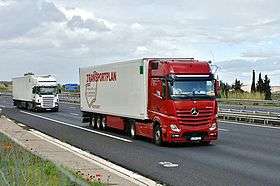 New Actros in France | |
| Overview | |
| Manufacturer | Mercedes-Benz |
| Production | 1995–present |
| Body and chassis | |
| Class | Truck |
| Chronology | |
| Predecessor | Mercedes-Benz SK |

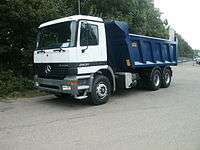
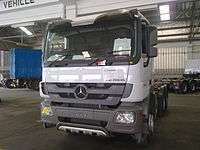
.jpg)
The Mercedes-Benz Actros is a heavy duty truck introduced by Mercedes-Benz in 1995. It is normally used for long-distance haulage, heavy duty distribution haulage and construction haulage. It is available in weights starting at 18 tonnes and is powered by a V6 or V8 cylinder diesel engine with turbocharger and intercooler. Daimler Trucks/Lorries launched the version II of the Actros in 2002, and the version III in 2007.
Engine
The Mercedes Benz Actros is equipped with two types of engines. The OM 501 LA-541 and the OM 502 LA-542. The OM 501 is a 12-litre V6, and has outputs ranging from 310 HP to 480 HP. The engine management system employed by this engine is the PLD (Pumpe Leitung Duese-German abbr) which incorporates single plug-in pumps for each cylinder supplying fuel under pressure (up to 1,600 bar) to the injection valves. A control unit MR monitors all engine operating conditions via several sensors and varies the injection pressure to suit each operating condition.
The fourth version offers several engine options in either Euro-5 or Euro-6 compliant models, with various power output.
Gearbox
The second Actros generation comes with an electronic sequential gearbox that Mercedes-Benz has dubbed the "Telligent Gearbox". It pushes forward the principle used in some earlier Mercedes-Benz tractors; using the gearshift lever to command a pneumatically actuated system that changes the gears. The Telligent gearbox utilizes a computer, together with a load-sensing system on the fifth-wheel coupling, to estimate the proper gear that the truck must be in. For example, if you want to upshift, the computer estimates the load on the tractor and the current engine mode, and gives you the proper gear for decreasing engine RPM. On the other hand, if you want to downshift, the computer assumes you wish to overtake, and gives you a proper gear for acceleration.
There's an automatic version which works like the Tiptronic system found in Mercedes-Benz cars.
The fourth-version launched in 2011 offers exclusively the 12-speed powershift transmission.
Operation
The system consists of a small lever mounted under the right armrest and a flat switch underneath. The lever is slightly tilted, so that it matches the natural curve of the driver's hand when it's on the armrest. The lever has two buttons on either side. When at a standstill, the driver must push the right button, then (while holding it), push the lever forward and release it select fourth fast. The current gear is shown as a large number on the main display. After doing this, the driver steps on the clutch pedal and waits for approximately two seconds. After the gearshift has completed, a double click is sounded through the speakers, and the driver proceeds with pulling off as normal.
Once moving, the driver has two choices. He or she may push or pull the lever to let the computer choose the gear for them, or they can use the splitter switch (the small switch under the lever) to pre-select gears. Either way, the gear is selected first, then the clutch is depressed. For example, if you're in fourth fast, pulling the splitter switch up once pre-selects fifth slow.
The left button (known as the 'flush button', as it is flush with the lever) is used to switch to neutral.
Advantages
Since the driver does not directly operate on the gearbox, it significantly reduces the wear and tear on the gearbox itself. The gearbox is fully synchronized, and in some models the computer would even blip the throttle for you for a smoother downshift. Also, it's great for novice drivers, who are not sure of the proper gear. The Actros is best described as a no-nonsense machine which can work extremely well in everyday road transport variations if maintained properly and operated with an understanding of the vehicle's core design.
The Mercedes Actros is one of the most desired trucks on the export market, as they perform very well in high temperature and humid condition
Cabin
The cabin of the Actros is built with consideration for the driver. It provides a silent, smooth and pleasant ride. Pneumatic suspension of both the cab and the tractor itself makes for a really smooth feeling even on the roughest road. The high-roof sleeper version provides two bunks (the upper one not usable while driving, as the seats must be folded). The upper bunk is somewhat wider, but all the controls (radio, windows, auxiliary heater, etc.) are available from the lower bunk. However, most of the controls one would need (auxiliary heater, sunroof, etc.) while resting are doubled overhead of the driver, and the width of the upper bunk allows for a person to use them by merely stretching their hand.
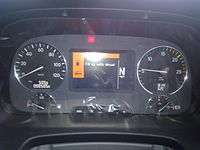
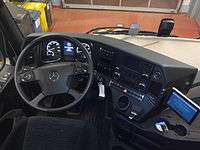
The auxiliary heater can be programmed to turn on, for example, 30 minutes before the driver enters the truck, so in the colder months a driver would be able to enter a warm cab instead of waiting for it to warm up.
There are large storage spaces, especially in the MegaSpace cab. Additional storage spaces are available under the lower bunk. In some cab types there are boxes behind the doors, that open from the inside, but are accessible on the outside - for storing tools, lashing belts, ratchets, etc.
The driver seat is a fully adjustable Grammer pneumatically suspended seat, and the passenger seat only allows for backrest adjustment. The steering wheel is fully adjustable as well, and allows the driver to control functions of the on-board computer as well as the built-in radio/CD player and the bluetooth phone control.
The cab has excellent sound isolation and provides almost car-like noise-levels.
The Actros cabs come in three types:
- S - designed for daily operation and construction vehicles such as cement trucks. The daily cab has its front bumper lower to the ground to prevent under-run, whereas the construction version of the S cab has its front bumper higher to prevent hitting an obstacle when driving off-road on the site.
- M - designed for distribution vehicles. It offers a sleeper, though comfort has not been focused on as in the L cab. It comes in short and long sleeper versions.
- L - Low-roof long-haul cab, providing comfortable driving and rest for the driver.
- LH "MegaSpace"- Long-haul high-roof cab, providing comfort for long driving, as well as enough space for the driver and/or passenger to freely move around the cab when needed.
Version 4 Actros are offered cabs in either 2300 mm or 2500 mm width and varied heights. A new solostar concept is available as an option for more comfort when used in a single-driver environment.
Electronics
Depending on model either Actros 1,2 or 3 the electronics may vary. For example, the braking system known as EPB or BS from Wabco incorporates ABS and ASR functions. This system is very reliable and efficient. The stopping distance in the Actros was drastically reduced as compared to its predecessor the SK. In later models of Actros 2 and all Actros 3 models the braking System was improved to EPB 2.
The Electronics in the Actros 1 are networked via Controller Area Network (CAN) in a system known as IES (Integrated Electronics System) with the instrument cluster as the Central Gateway (CGW) or the interphase. In the Actros 2 and 3 the electronics are networked also by CAN in a system known as KontAct (Concept of the Electronic systems in the Actros).
There is a wide range of other electronic features, offered as extras. These include lane assist (warns the driver if they inadvertently leave their lane), Autonomous Intelligent Cruise Control ART (which engages the brakes if the vehicle in front suddenly stops), side looking radar for warning the driver about a vehicle in their blind spot, and many more, mostly oriented towards safety. All of them are marketed as "Telligent".
Problems with electronics
In some cases, when the electronics of the trailer (especially the ABS sensors in the wheels) get wet, the brake pedal would not operate as normal, and even the slightest touch would result in a wheel-lock. There are problems with the calculation of the mileage available for the remaining fuel. Cases have been reported when the fuel has run out with the computer showing 25 more miles to go. Also, the statistics of average speed and fuel consumption are prone to failure when driving a digital tachograph truck without a driver card. This problem has now been solved by a software update from Mercedes. The Powershift transmission has also had a clutch kit/pressure plate failure issue with a recall in late 2009 some trucks have had further clutch cylinder failures with no remuneration from the manufacturer.
Military variants

Actros Armoured Heavy Support Vehicle System (AHSVS) is a military armoured truck (86 ordered by Canadian Army in 2007) using the civilian Actros platform with a protected cab developed by Land Mobility Technologies in South Africa in cooperation with Composhield of Denmark for Mercedes-Benz. [1]
Singapore uses military variants of the Actros for its Singapore Army - in heavy-lift logisticial support roles, designated as the HMCT (High Mobility Cargo Transporter), recently as a launch platform for the air defense system and the short-range ballistic missile.
New Actros (2012)
In July 2011, the manufacturer of Mercedes Benz Trucks, Daimler AG, launched the 2012 Mercedes Benz Actros. This may not be referred to as Actros 4 but it is the New Actros. This is because there were several similarities between Actros 1, 2 and 3. The new Actros has no similarities with its predecessors save for the name.
For the very first time the Actros features a six-cylinder inline engine using Common Rail Diesel Technology with X-Pulse as opposed to the PLD system used previously.
Gallery
See also
| Wikimedia Commons has media related to Mercedes-Benz Actros. |
- New Actros 2012
- Mercedes-Benz Actros Malaysia
- Dump truck
- Tractor unit
- Semi-trailer and semi-trailer truck
- Sisu Polar
References
- ↑ "LMT wins Danish order". Defenceweb.co.za. 2010-02-11. Retrieved 2012-03-17.


-2004.jpg)

